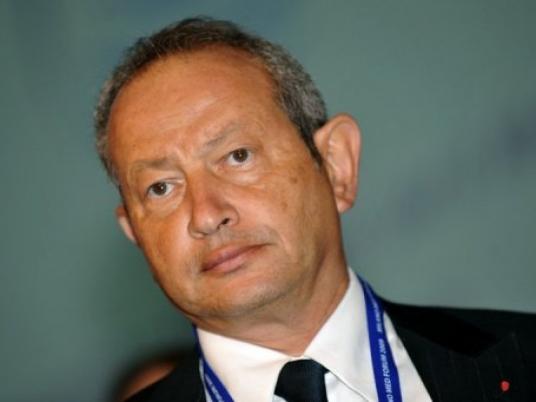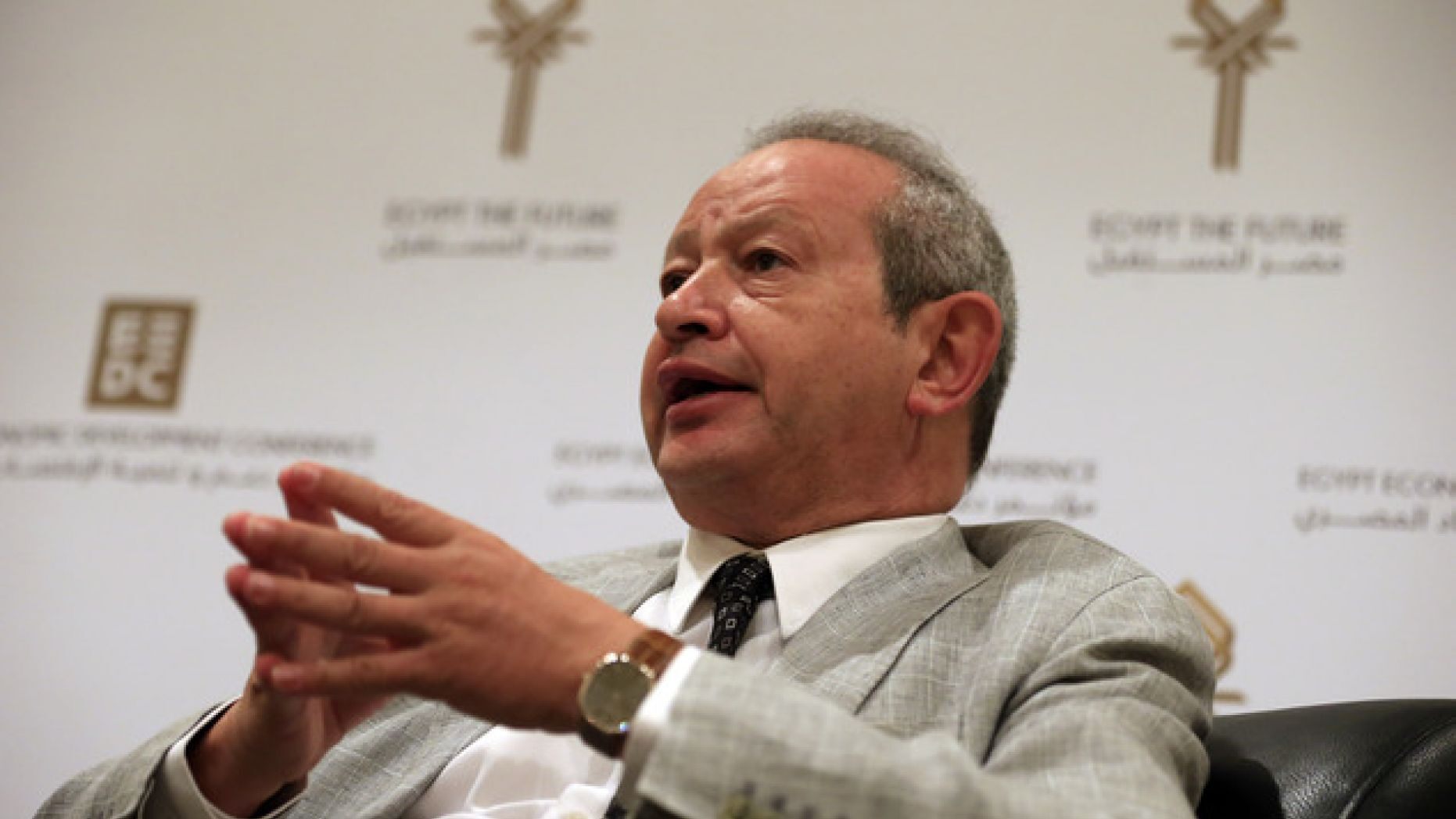
A surprise decision by Egyptian billionaire Naguib Sawiris to sell his satellite channel ONtv to Tunisian film producer Tarak Ben Ammar has raised questions about the intentions of both.
The news sparked questions over the future of Sawiris’ presence in the Egyptian business sphere and also spurred speculation over Ammar’s media plans for the region.
The deal was kept clandestine until 5 December, when a statement was released saying that Ben Ammar “acquired Naguib Sawiris’ ONtv network in a groundbreaking deal that signals a dramatic development in the Arab media landscape.”
ONtv will be run out of its head office in Cairo, according to a statement from Ben Ammar’s office, and will remain “an independent news channel with no affiliation to any political party and with its management exercising complete editorial independence.
“ONtv will benefit from the new non-Egyptian ownership that has no connection or ties to any political group in Egypt and is committed entirely to ensuring impartiality and respecting the diversity of views in the country,” it added.
Launched in October 2008, ONtv has toed a progressive line in its presentation of programs and news shows. Its presenters are outspoken and its coverage of the 25 January revolution boosted its credibility and viewership among an expanding audience base.
Over the past two years, it has come under fire on several occasions for its bold take on current events, challenging the rhetoric of state-run media — widely seen as the government’s mouthpiece — and the reality of events as presented by the ruling military council, which came into power after Hosni Mubarak’s ouster.
It continues to do so under the rule of President Mohamed Morsy, the candidate of the Muslim Brotherhood’s political arm, the Freedom and Justice Party. During his short time in office, both public and private outlets have complained of media restrictions and intimidation, especially in the past weeks, amid rising opposition against the constitutional declaration and the draft constitution.
ONtv’s founder, telecom tycoon Sawiris, had set out to widen the horizons of Egypt’s media landscape, and, in that context, the channel is perceived as a success story.
Selling ONtv is one in a series of recent business transactions by Sawiris which, some observers argue, is an indication of a redirection elsewhere of his vast investments in the country.
In February, after a protracted court battle, Sawiris reached an agreement with France Telecom to sell most of his shares in Egypt’s largest telecom provider, Mobinil, but his company retained a significant number of seats on the board.
He next moved in on Russia’s Vimpelcom, becoming a shareholder in a cash and share deal worth US$6 billion, whereby he sold 51 percent of his stake in Orascom Telecom and his entire share of Italy’s Wind. The deal also included top revenue earner Djezzy, an Algerian subsidiary, after a standoff with the government over taxes.
Most recently, he has shown interest in Telecom Italia, which, as Reuters reported, is his way of rebuilding a telecom empire — but in developed markets.
“When you invest in the West, you are sure at least that law and order applies,” he told Reuters.
After the revolution, he delved into the political scene, forming the liberal Free Egyptians Party as a counter balance to the emergence of the FJP, as well as the Salafi Nour Party.
His main aim has openly been to ensure that Egypt remains a civil state. In contesting the 2011 parliamentary elections, the Free Egyptians Party launched an electoral alliance with other secular political parties, called the Egyptian Bloc, but only garnered about 7 percent of the vote.
Sawiris was mired in controversy with Islamists in June 2011 when he tweeted a cartoon depicting Mickey Mouse with a beard alongside a veiled Minnie Mouse. Salafi lawyer Mamdouh Ismail filed a lawsuit accusing him of insulting Islam.
Though he officially apologized, Sawiris was referred to a misdemeanor court, but was later acquitted.
On the receiving end of the ONtv deal is Ben Ammar, who owns Paris-based film production and distribution company Quinta Communications. He is known to have a passion for movies featuring North African culture.
Reports indicate that he is a personal adviser to Saudi business tycoon Prince Alwaleed bin Talal, as well as being the business partner of controversial Italian politician and media tycoon Silvio Berlusconi.
He and Berlusconi co-own the Tunisian television channel Nesma, after buying half of it from brothers Ghazi and Nabil al-Karawi, known for having close ties to ousted Tunisian President Zine al-Abidine Ben Ali. Ben Ammar is also Wassila Bourguiba’s nephew, the wife of late Tunisian President Habib Bourguiba.
Nesma, like ONtv, is known for its liberal tone — so much so that it was the subject of a scandal before the October 2011 Tunisian elections when it broadcast a French film that depicted God, which is banned in Islamic practice.
Islamists came out in full fury against the channel. One of the Karawi brothers was sentenced to prison by a court but was later released.
Tunisian journalist Wajd Abdallah told Egypt Independent that the incident was heavily used by Islamist political forces in Tunisia, helping them campaign against liberals to win almost 40 percent of the constituent assembly seats.
Abdallah added that while the channel’s editorial agenda staunchly opposes the Brotherhood, it cannot be described as particularly revolutionary.
In a televised appearance on Nesma, Ben Ammar and ONtv’s chief executive, Albert Shafiq, vowed to create a media empire that would challenge the domination of Gulf money in the Arabic media landscape.
In this context, initial readings would find Nesma and ONtv fit perfectly with Ben Ammar’s plan to create a regional media empire.
“People think I must be crazy to invest in Egypt in such a turbulent media and business atmosphere, but I trust the Egyptian people,” Ben Ammar said.
ONtv’s liberal leanings underscored the authentic Egyptian nature, he added, and were vital to counter the influence of Gulf media’s aim to reshape North African culture.
“Our economy heavily relies on culture. I do not have the big funds that the Gulf has, but we [in North Africa] have the people. Let’s give the chance to those who do not have money, but have the culture and the people,” he added.
Ben Ammar is planning to launch a sister channel to Nesma in France to address the population of more than 7 million Arabs and Muslims there.
“With the Tunisian Nesma, which addresses over 90 million viewers in North Africa, ONtv, which addresses 90 million in Egypt, and another 10 million addressed by the new Nesma channel in France, we can create a panel of networks that can be the foundation of a North African media empire,” he said.
Shafiq said ONtv was fighting attempts to “erase” Egyptian culture and was trying to defend its national identity, which was being impinged on from inside and outside.
Egypt’s “soft power” lies in its cultural domination across the Arab world since the 1950s, he added, and “enough with interventionist media that carries a strange culture.”
Opposing views criticize ONtv for peddling Western values and being biased against the Islamist current.
Abdallah says acquiring the channel will be a “successful media investment” for Ben Ammar.
“ONtv has a huge Egyptian audience that favors the revolutionary awakening in Egypt and I think this is what Ben Ammar is bidding on. He is promising no intervention in its editorial line, which is vital. We will see how it will be implemented in the future,” she adds.
A source close to Ben Ammar who prefers to remain anonymous told Egypt Independent that the Tunisian businessman needed Egypt to build his North African media empire.
“The base has to be in Egypt. We understand the fears of Egypt’s troubled transition to democracy, but we know it will take time to stabilize. We trust the Egyptian people,” the source added.
This piece was originally published in Egypt Independent's weekly print edition.



